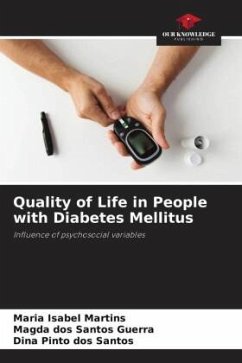The increase in life expectancy achieved through development in general, and progress in health sciences in particular, has given rise to a higher prevalence of chronic diseases. Diabetes is one of these diseases with no known cure and one of the most important causes of morbidity and mortality. Severe, extreme complications include cardiovascular problems, hypertension, kidney failure, blindness, and amputation. Since most acute diseases are increasingly under the control of medical practices, health-related approaches seem to be more oriented towards chronic diseases, seeking to maintain life with maximum dignity and quality, with the perspective of a more comprehensive path of health based on well-being and quality of life and not only directed towards disease. In fact, the person's perception of his health status has been considered as an adjunct to traditional indicators in the assessment of health needs, considering that complex physical, emotional and social interactions are involved in the development of diseases and influence the results obtained with treatments.
Bitte wählen Sie Ihr Anliegen aus.
Rechnungen
Retourenschein anfordern
Bestellstatus
Storno








